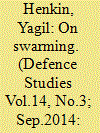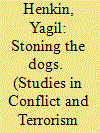|
|
|
Sort Order |
|
|
|
Items / Page
|
|
|
|
|
|
|
| Srl | Item |
| 1 |
ID:
192673


|
|
|
|
|
| Summary/Abstract |
On 29 October 1956, the first day of the Suez War, detachments of the Israeli Border Police massacred forty-seven Arab men, women, and children in the village of Kafr Qasim. Although the government and army denounced the atrocity, some historians have since argued that the massacre was planned by high-level military and government circles. The government’s goal, according to this view, was to drive the Arab villagers across the border in line with a contingency plan known as Operation Mole. We present an alternative view based on new documents: rather than being either part of a preconceived plan of expulsion or an aberrant individual crime, the massacre was in fact a result of an Israeli deception plan that got out of hand.
|
|
|
|
|
|
|
|
|
|
|
|
|
|
|
|
| 2 |
ID:
075413


|
|
|
| 3 |
ID:
132726


|
|
|
|
|
| Publication |
2014.
|
| Summary/Abstract |
In recent years, the idea of 'swarming' - that is, simultaneous multidirectional attack or maneuver by large number of independent or semi-independent small units - became a subject of a heated debate. Some believe this is the future of warfare, while others see this belief as ridiculous and dangerous. In the Israel Defense Forces (IDF), specifically, swarming was heralded as the new way of war before the 2006 Second Lebanon War. But during and after the war, the word itself was turned into a derogatory term, symbolizing all that was wrong with the IDF's performance: relying on new, untested and unrealistic concepts to pretend that the Army has a silver bullet which will solve its problems quickly and easily, ignoring reality in the process. This article draws on six historical case studies, from the American airborne operation in the Normandy Invasion to the Second Lebanon War, to examine the method of swarming, its relevance and its uses. Finally, the article concludes that Swarming is not a revolutionary method, and not 'The future of conflict'. However it is a very useful method in certain situations, provided that commanders know and understand its possibilities and limitations.
|
|
|
|
|
|
|
|
|
|
|
|
|
|
|
|
| 4 |
ID:
120932


|
|
|
|
|
| Publication |
2013.
|
| Summary/Abstract |
Rhodesia, a breakaway British colony, was engulfed in an insurgency through much of its short history. African guerillas, rebelling against the white minority government, have killed many more African civilians during the war-the same group that formed their base of support-than either government soldiers or European civilians. The violence was not only intended to punish enemies of the guerilla-traitors or collaborators with the government. Nor was it the result of lack of popular support. Violence forced guerilla sympathizers to actively support the insurgency or participate in it, despite the considerable risks this participation carried. Political support should not be mistaken with mobilization. Without violence, the lack of benefits and the danger of government reprisal may have kept many from actively assisting the insurgency, despite politically identifying with the guerillas and hoping for their victory.
|
|
|
|
|
|
|
|
|
|
|
|
|
|
|
|
|
|
|
|
|